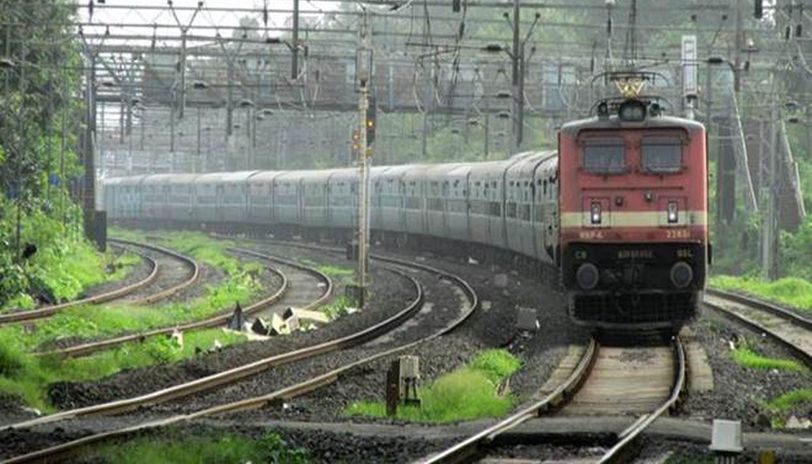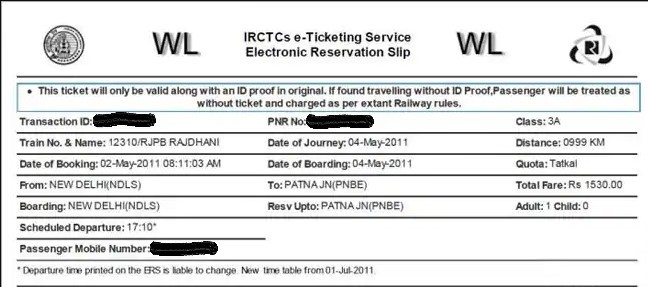
Railways have been one most crucial mode of transporting passengers as well as freight. It has proven as the backbone of the many economies and continues to do so. Imagine if that backbone gets injured or gets broken down?
India has one of the Largest Railway Network in the world solely operated by the Central Government. It carries billions of passengers and tonnes of freight every year. Being a sole provider of Economic Transportation Services, it is barely able to turn it profitable. Indian Railways Revenue in FY19 was about Rs 2 Trillion, and Net Profit was Meagre 6000 Crores. There has been a lot of talk about the inefficiencies and increase in the cost of Indian Railways. Given the scenario, where given infrastructure is limited in terms of railway tracks, thus the maximum train that can run on the tracks is also restricted. Earlier this year, Government implemented fare hike for AC and Non-AC Segment Across the board. What if Instead of Increasing Revenue to increase Cash flows, Railways Could Increase their Profits and Cash flows by Decreasing the Fare?
Below is the Screenshot of an Indian Railway Train ticket –

Below Four details has already been captured in Railway ticketing system:
- From Station
- To Station
- Boarding Station
- Reservation Up to Station
One should note that by default, “To Station” and “Reservation Upto” station is the same in an Indian Railway Passenger Reservation System (PRS)
Changes Suggested:
- Like “Boarding”, “To Station” should also have a drop-down value.
- Passenger should get an incentive if he books a ticket for the route longer than he actually intends to travel. (Just to avail benefits of High Quota on longer routes)
Scenario 1 – Normal Case Scenario
Above given is the distance covered by the railways and typical fare corresponding to Distance Travelled. Suppose a person wants to travel from Surat to Kota, he/she would book tickets from Point 2 (Surat) to Point 3 (Kota) and pay 1340/-
Scenario 2
What if a person wants to travel from Surat to Kota, but the tickets aren’t available? He/she would try to book tickets from Mumbai to Delhi, where the Boarding Station will be mentioned as Surat. Luckily there are tickets available for this Journey, but it would cost him 2225/-, Far higher than the typical Surat to Kota Fare which is 1340/-. The Person had to pay 885 more to avail a confirmed ticket. Here the Seat *officially* remains unoccupied from Mumbai to Surat and from Kota to Delhi. In this scenario, Railways can sell those vacant seats and provide a Cashback to the original passenger if the same are sold.
In the above scenario, we assume that a 20% Cashback on the fare is provided to the person who is travelling from Surat to Kota on a ticket which was reserved from Mumbai to Delhi.
By providing the following incentive, we get the following benefits:
- Waitlist Ticket from Kota to Delhi and Mumbai to Surat gets Confirmed.
- The Original Passenger effectively shells out less from his pocket.
- Revenue of the Railway increases.
Scenario 3
In this scenario, it has been assumed that the ticket is available from Mumbai to Kota, and the Consumer Purchases the ticket and mentions boarding Station as Surat. In Current Scenario the Consumer has to pay 1735/- and as the boarding is Surat, the Seat will *officially* remain unoccupied from Mumbai to Surat.
Again, when we introduce an incentive:
We are still better off than the current scenario. All the benefits of Scenario 2 apply.
Scenario 4:
In the final Scenario, it is assumed that the traveller is able to book ticket from Surat to Delhi but wants to travel only till Kota. The passenger pays 1945, which is way more than 1340. In this case, the person would de-Board the train at Kota Junction. But his ticket is reserved up to Delhi and so the seat from Kota to Delhi would *officially* remain vacant. Similar to the above Cases,
We are again, still better off than the current scenario. All the benefits of Scenario 2 apply.
Note: The Cashback of 20% in the above scenarios is just a rough estimate. The exact amount of incentive can be only arrived upon post doing proper data analysis. The point made here is just that we can incentivise to increase efficiency.
Conclusion
With just a simple change of Validation rule in the Passenger Reservation System, we can improve FOUR major issues faced by Indian Railways:
- More confirmed PNR’s
- Decrease in Out-of-Pocket expenditure for the end consumer.
- Increase in Revenues of Railways
- Reduce the burden on TTE for allotting seats as the system is now automated
“What if solutions are faster than the problems?”
Saurabh Bhauwala
Subscribe to our Newsletters to get exciting content delivered to your Mailbox!






Great article Saurabh. Being a Mumbaikar, I can relate to this problem very well. I always find it very difficult to get confirmed tickets for short journeys, even if many seats are vacant. This idea needs to be implemented.
Thanks a lot, stay tune, lot more to come….
This is so true. People in rights position and power should definietly read this. We would really want to watch this idea come into reality Sourabh sir. 🙏💯
Indeed a great idea Saurabh 👍
Thank you, Rahul
looking forward to having you as a harsh critic to horn my thoughts in the right directions for my upcoming articles.
Great article and the practical solution for current problems of IRCTC
Thanks Mohit
Your article is very interesting to read. You’re doing a great job. Keep it up. Thanks for sharing your idea!!
Thanks Rajiv
It is interesting and you have worked hard on this. Congratulations. My only point is based on some earlier information, that Tatkal booking charges are from point to point and the resultant vacant positions are reserved later and railways do get higher revenue. Passenger is ready to pay more for the urgency.
Thank You
Thanks Mam
Interesting article and insightful solutions!
Thanks Shalini
Nicely Written.
Thanks Sumit
Great article
Thanks Anchal
Beautiful insight on railways, appreciated. I believe such efforts should reach to the railways for an immediate introspection at their end.
Thanks Atul
Great article. I always wondered why Indian Railways cannot be run profitably. Your article throws light on one aspect. Good job
Thanks Rohit
Firstly IRCTC sight doesn’t open. Secondly So much permutations and combination does require a huge software upgrade. In my view full electrification and privatisation is only option for railways to give value for money . Garib rath should be there for others.
Hi Gaurav,
Railway is already working on huge permutation and combination, such as fare based on distance…, others such as tatkal, Ladies, Senior Citizen etc…
Opinion mentioned here is to use existing System with minimum changes.
Government is already working towards full electrification of railways.
Nice article. Great insight.
Thanks Jitender
Brilliant yet very simple process innovation. Thinking different.
Thanks
Interesting well jotted down, the solution was always available. These were the opportunities for Agent/TTE/ other officials to manage and make quick buck.
Hopefully system will take cognizance and act.
My take no privatization.
Thanks
Thanks Ravi
Nice Sir.
Thank You
Great article and a well thought analysis of the problem.
Insightful
Great Article Sir, And it was very interesting to read the Article, Keep Going, All the Best
Great one Sir the method should be implemented right now as many trains are not working and it could get carried on more smoothly.
Great Work Mr. Saurabh Bhauwala
Good analysis, ….. Food for thought 👍
Great article
Thanks
Great idea.
It is a very great idea to be implement on indian railways.
Great piece. With the various scenarios explained I can clearly imagine how we can improve the operational efficiency of the Indian railways
Wonderful illustration. A win win suggestion for the user and railways.
This is called outofbox thinking. Well researched article and can be used by Railways to augment resources. As a regular train traveller I visualise this is a win win situation for both railway and passenger. Congratulations and best wishes.
Yes sure it can , but it can be done for locals cause quantity matters if we have to get more revenue !
Not only in railways, this form of thinking which is strategic in that it considers possible scenarios in combination with simple math to validate the result, can provide backbone to many simple yet overlooked phenomenon with major consequences.
The simplicity and yet it’s effectiveness, the only thing is of how long it will take for a decision upon these suggestions and to actually implement them, then the article can be considered brilliant.
Great article!
I completely agree with you sir! Great article. It was quite simple and informative at the same time.
Great article Saurabh. A domain which needs a total revamp from the economy’s perspective
Great read. Good luck
Great article sir, explanation is very ease to understand also like to read more article further
Great Article
Greate article on this current situation. Really thoughtful.
Beautiful peice, thanks for sharing 🙂
Great Article
So, Amazed to see the loopholes of Indian railway system in various scenarios
Great idea! its a problem faced by so many people including me i am living in surat whenever i travel to jaipur many time i have to book my ticket from Mumbai to Jaipur ( boarding Surat) and pay extra fare i.e. Mumbai to surat. Through this solution Passenger and Railway both are in Win Win Situation.
Right now the above mentioned solution provided by TC as they have data sheet and for the same they charge from the passenger without issuing tickets.
Good…That’s way the railway can make more profit with a happy traveller.
Great work!!
I think your point is logical & railway should take note of this